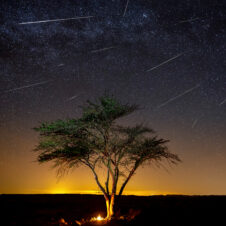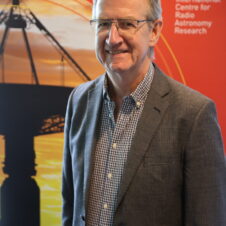 From the red dirt to the red carpet
From the red dirt to the red carpet
Pilbara-born ICRAR PhD candidate Ryan Urquhart has won a Premier’s Science Award for his work on the Universe’s fastest-feeding black holes.
Ryan, who is based at Curtin University, was the joint winner of the ExxonMobil Student Scientist of the Year for his research into rare objects known as ultraluminous X-ray sources.
During his PhD, Ryan discovered the true nature of a rare sub-class of ultraluminous X-ray sources, showing that they represent some of the fastest-feeding black holes in the Universe.
He also studied ultra-powerful jets coming from other fast-feeding black holes, and even discovered two new black holes in the nearby Whirlpool Galaxy.
Ryan said ultraluminous X-ray sources exceed the theoretical limit on how bright an object can be based on its mass.
“When these objects were first discovered 30-odd years ago, they were initially thought to be very massive objects,” he said.
“But astronomers are moving towards a consensus where they believe that most of these systems house relatively small objects that are feeding faster than we thought was possible.”
In fact, at the time Ryan started his PhD it was discovered that some ultraluminous X-ray sources are actually neutron stars, even smaller objects that are likely feeding at even more extreme rates.
“That was exciting for me because it meant that I was part of such a rapidly advancing field,” Ryan said.
Ryan said people love black holes and aliens, and he has been lucky to study both of them.
He spent his honours year searching for extra-terrestrial life with SETI and the Murchison Widefield Array telescope but always knew he’d come back to black holes.
“It’s just exciting,” Ryan said.
“Black holes are extreme objects and I get to study the fastest-feeding variety of them, so the extreme of the extreme.
“I can’t think of anything more interesting.”
During his PhD, Ryan travelled to the United States and spent two weeks at the Harvard-Smithsonian Center for Astrophysics.
He presented his research at Massachusetts Institute of Technology, the University of Iowa and the University of Michigan.
He was also recognised as an expert reviewer by a leading astronomy journal, despite his early career stage.
Ryan submitted his thesis in July and has a postdoctoral position lined up at Michigan State University.
It’s a far cry from his home town of Karratha.
“I grew up in regional WA, in the Pilbara, so I’ve only ever known 45C temperatures and now I’m going to move to where it snows,” he laughed.
“I don’t know if I’m going to cope.”

